Culture
2018’s 48-Hour Shootout: Up-Close and Personal With the Winning Teams
By: Emily Votaw
Posted on:
The 2018 48-Hour Shootout has come and gone, leaving in its wake a number of impressive short films that were cobbled together in a matter of only a (literal) couple of days February 2 through February 4, 2018.
WOUB’s Emily Votaw spoke to each of the ranking teams from the competition, trying to get in depth information on their individual creative processes, the various roadblocks that came up throughout the hurried productions, and what each group took away from the strenuous weekend.
FIRST PLACE IN THE OPEN DIVISION
“Give It a Shot” by Third Place Productions
Genre: Western
In this film, a young woman is tasked with watching an old western movie, which she finds endlessly boring to the point of putting her to sleep. As she slumbers, she slips into another reality wherein the days of the cowboy are not so far in the past. In the end, she saves herself, but in a rather exciting fashion.
WOUB: What were your initial thoughts when you ended up with the “western” genre?
Baylee Gorham, Junior, Integrated Media (Director of Photography): There must be a duel!
Vanessa Henning, Junior, Integrated Media (Director): Thank god I’m directing it and not writing it.
Leah Nutter, Junior, Integrated Media and Spanish (Producer): They didn’t have post-it notes in the old west! And our prop was a post-it note.
Hope Mueller, Junior, Integrated Media (Writer): Carley and I, the writers, already had talked about the possibility of us getting western and we already had an idea of what we wanted to do. We were oddly prepared story-wise for a western, and honestly I was really excited for the challenge.
WOUB: What was the inspiration for the plot of your movie?
Carley Matson, Junior, Integrated Media (Writer): I was originally inspired by an episode of Black Mirror to make a short about a girl watching a Western film that essentially causes her to get trapped inside of the film. Hope and I developed the idea further and tossed around tons of ideas with the rest of the team before finally coming up with the final plot.
Hope Mueller: My main thought was to make a semi-funny western that almost made fun of the genre itself. Westerns are a bit outdated, so we used that to our advantage. We wanted to take those tropes and twist them a bit. We had the concept of a woman kind of being transported into a western, and she’s like a fish out of water, so of course she isn’t going to totally comprehend these macho male archetypes out male characters presented. We wanted it to be funny, but also female empowering, and I think we hit the mark.
WOUB: How did you find a location with cattle to shoot at? What was the process of securing that?
Baylee Gorham: While shooting b-roll we came across a man in a tractor feeding his cows and we pulled up, flagged him down, and asked if we could film his cows. He was very understanding and helpful despite the spontaneity of the encounter.
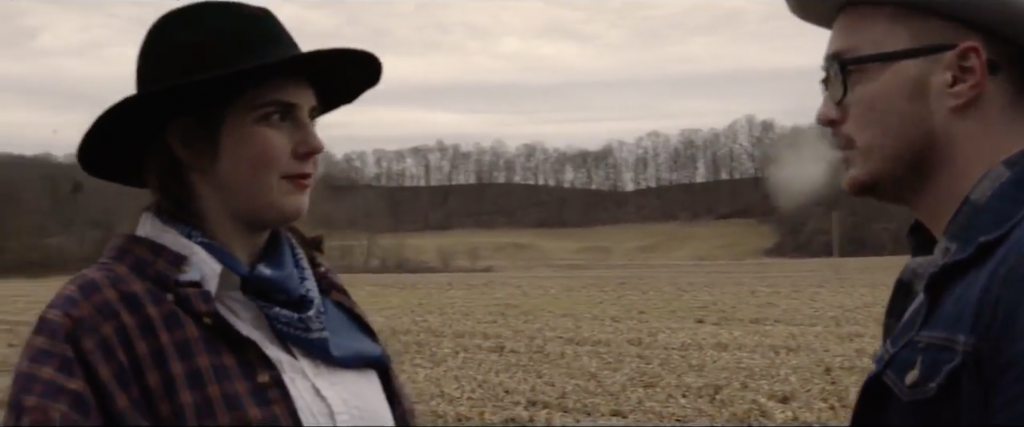
Vanessa Henning: A moment of luck really. We shot a lot of b-roll, and didn’t know if any or all of it would be in the final cut. The cows just happened to be the right fit for the scene.
WOUB: I liked that our heroine was never saved by the “big, strong cowboy,” – could you elaborate on that creative decision?
Baylee Gorham: As an all female team we definitely wanted to challenge some of the traditional western tropes
Carley Matson: I wanted the heroine to save herself and not give in to stereotypical Western movie tropes that typically rely on the big, strong cowboys to save the day from the bad guys. Our heroine hates old west films because of stereotypes like that so she wasn’t willing to settle on being saved.
Hope Mueller: We wanted our main character to fight those western stereotypes of a man saving the day, so we wanted her to refuse his help.
WOUB: How was the progression of the filming – what were some major roadblock or unexpected advantages?
Leah Nutter: I think we had somewhat of an advantage because our team members had cars on campus, so we could drive to some more rundown locations with all of our equipment. I don’t know if our film would’ve been the same if we didn’t get the locations that we did.
Baylee Gorham: I think the biggest challenge was working against the clock and filming everything we needed to before the sun set. It taught us a lot about working as efficiently as possible.
Vanessa Henning: The biggest thing that worked against us was the weather. On the day of filming it was below freezing and we were outside all day long. We only had one interior shot throughout the entire short. The greatest advantage were the parameters we had to work within. Having to make a western in Ohio in below freezing temperatures forces one to be creative.
I wanted the heroine to save herself and not give in to stereotypical Western movie tropes that typically rely on the big, strong cowboys to save the day from the bad guys. Our heroine hates old west films because of stereotypes like that so she wasn’t willing to settle on being saved. – Carley Matson, writer of winning entry to the 2018 48-Hour Shootout
Tess Greweling, Senior, Screenwriting & Producing (Actor, Producer): The snow that fell Sunday was also a major challenge. We struggled to finish shooting Saturday, so we had to get really creative about how we would maintain continuity. I’m very grateful we were able to make it work.
Hope Mueller: The weather was definitely the worst. Almost all of our scenes were outside so we basically froze all of Saturday. We had to get one more shot outside on Sunday, which was unfortunate because it was snowing and messed up some of the continuity. Also just the editing time frame was rough, our editor stayed up all night and then we basically exported 15 minutes before it was due. While we did not get to include every little detail we wanted because of the time crunch, we still produced something we were all extremely proud of.
Jessica Lucas, Senior, Integrated Media (Editor): The weather was definitely a challenge but our actors did a great job of convincing the camera that it wasn’t 20 something degrees! Editing was definitely a challenge. We decided it’d be best to edit on Adobe Premiere and I hadn’t really used it before this because I was educated on Final Cut Pro X. That slowed me down a little bit, but we got through it! We were definitely cutting it close to the time it was due but minus a few editing flaws due to time, I think we had a great turn out.
SECOND PLACE IN THE OPEN DIVISION
“Prohibition” by Son of a Glitch Productions
Genre: Science Fiction
It’s the future. And it’s in Athens. Alcohol, once one of the cornerstones of the culture in Athens, has been outlawed, bringing another prohibition to a town once rich in liquored mirth. Our hero steals a secret stash of booze from some unsuspecting fraternity brothers, only to find himself in a chase to preserve his own life. Son of a Glitch Productions is a member of AVW Studios, and director Christina Dietrich is currently the president of the student run video production house.
WOUB: Can you tell me a little bit about the creative process that led to the creation of “Prohibition?”
Christian Dietrich, Junior, Integrated Media (director): Well, we all kind of met at my apartment right after we got the genre on Friday night. We all sat around spit balling ideas for a while. We knew that we needed to establish a sense of place, since we were working with sci-fi, and my director of photography and my special effects person came up with some great ideas, but a lot of them were not ones that we could really do in a 48-hour time period. This isn’t my first 48-hour shootout, I had been on a team last year that tried to put together a film that we didn’t really have the time to make in 48 hours. Knowing that we had only that amount of time really shaped how we were going to do the story.
WOUB: Can you tell me about the writing of the story, how you decided to focus on the story of prohibition?
Christian Dietrich: Since it was taking place in Athens, we decided that it would be interesting to reference the alcohol culture in Athens, and see what it would be like if there was another prohibition in the distant future and how that would impact Athens. After we came up with this idea, my writer went off to the quiet room to come up with the first draft, and pretty soon after we started working on the first shot.
WOUB: How did you find your actors?
Christian Dietrich: We had one person on our team already who had acted in a couple of our movies, so we knew we had at least one actor. We decided to focus on him and thena few people around him for the film.
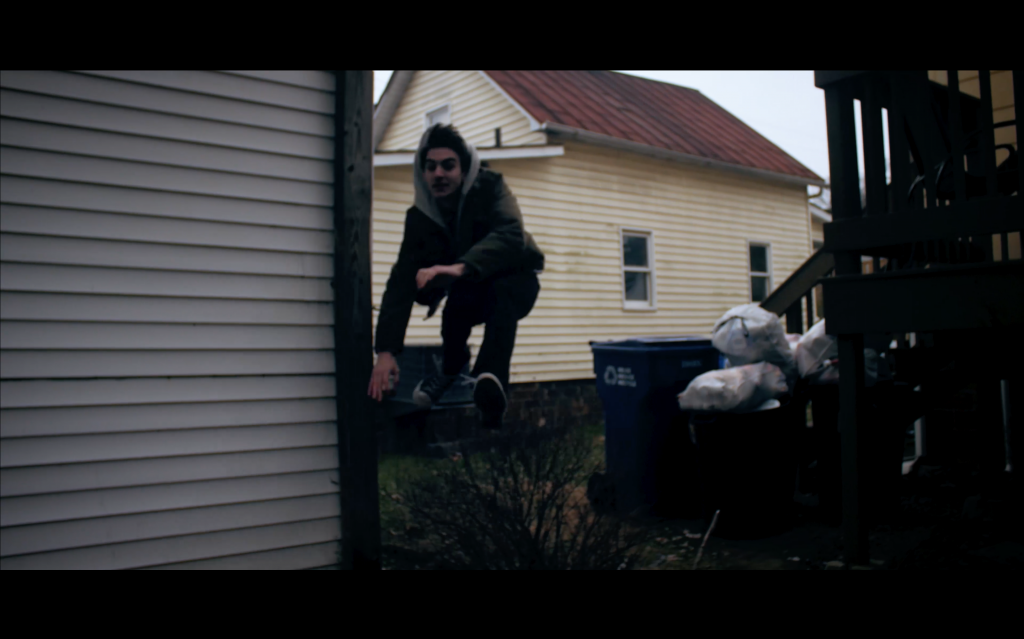
WOUB: Can you tell me about the inspiration for the aesthetic of the film?
Christian Dietrich: Collin Black, who was on my team, and I, are both big fans of Bladerunner, so even though we didn’t want to parody Bladerunner, we did want to show that we were inspired by it. The tone and look that we wanted to create for Prohibition was very much based on Bladerunner.
WOUB: Did your team run into any problems during filming?
Christian Dietrich: Honestly, we didn’t have a lot of problems. I went in fully expecting that we wouldn’t even get it done. In the team meetings that we had before the filming weekend, we had discussed that the two genres we really hoped we wouldn’t get would be musical or sci-fi, and we ended up with sci-fi. Honestly, the hardest part was choreographing the fight scenes at the end. In order to figure all that, we knew we had to shoot at night, and that we wanted to shoot in a particular parking lot. However, we misjudged when it was going to get dark, and ended up waiting about an hour and a half for it to get dark enough for the shot. We were going to use my drone, but because we had been waiting in the cold, I lost navigational control of my drone, so we couldn’t use it. That was our main hiccup. The other one was that it was often very crowded where we were shooting, so sometimes we would have to wait for a large crowd of people to leave the area. There was a particular moment when we were planning to break for lunch, but when we got outside, it was overcast, and perfect for another shot that we were planning on, so we forced ourselves to keep shooting and we postponed lunch. I think that if we had taken that lunch, we would have been much more tired when we came back, and maybe wouldn’t have finished the film at all.
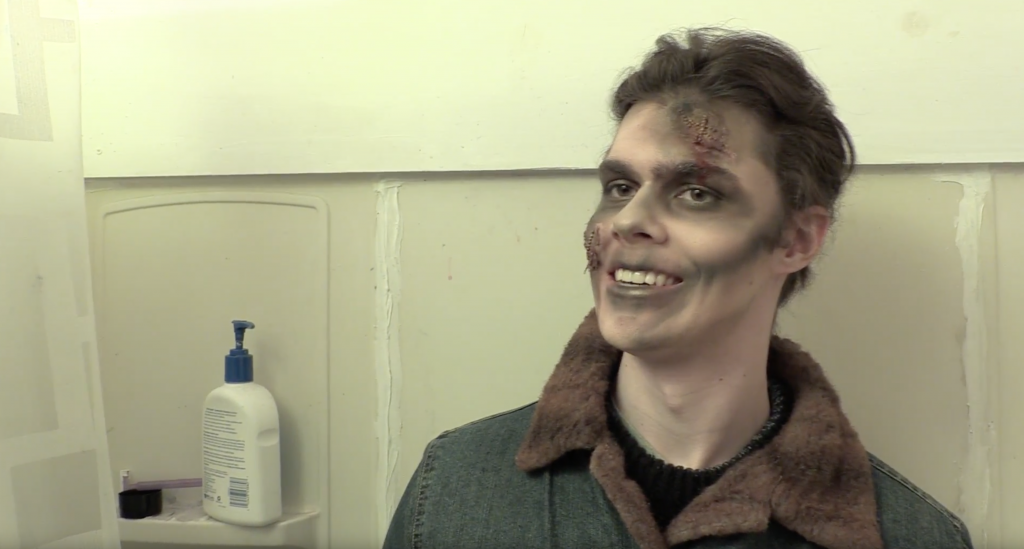
THIRD PLACE IN THE OPEN DIVISION
“Supernatural Stories to Spook Your Butt” by Get Out of My Room Mom and Let Me Eat My Dunkaroos In Peace
Genre: Supernatural
Split into a number of entertaining and bone-chilling vignettes, this film examines everything from the horrors of finding a mermaid in your bathroom to a monster making it’s way through a city of boxes to a shopping cart with a mind of it’s own to the terrors of capitalism.
WOUB: What were your initial thoughts when you got the supernatural genre?
Tanner Bidish, Junior, Screenwriting major, Producer and Actor: So I was in the meeting when we were assigned all our prompt and initially I thought ‘oh this is great Phil loves silly supernatural things!’ Like Evil Dead is one of his favorite movies. So when I got home after that meeting, the whole team was in my house watching Evil Dead highlights.
Phil Hickey, Junior, Integrated Media, Director: And if you look up the “best parts” of Evil Dead on YouTube, it’s all the wrong parts, it’s all the serious like gorey violence stuff when I just want to see Bruce Campbell dance around a lot in that movie but apparently it’s not best of compilation material
WOUB: How did you guys decide to make a few vignettes instead of a cohesive film?
Phil Hickey: That was actually Aaron (Brown)’s idea. We went into this kind of not really wanting to try too hard if we are completely honest we just wanted to make something that we would have a good time making and that we could be proud of. If we could get just two people to laugh, even if they were on our team, that would be enough. I just wanted to color on some boxes. I would be really upset if this wasn’t my first time buying crayons at midnight for a film.
Tanner Bidish: we started the writing process with about 12 people, and we would just go around the table and ask each other about each person’s ideas, and a lot of those rough ideas became a short vignette that was cool that lot fo people’s input got included.
Phil Hickey: One idea we had to cut was Avatar vs. vamprioes I thought it would be fun to paint my actors blue and make it look like garbage. But we couldn’t keep every idea. I will always use any excuse to papyrus font in a film.
WOUB: It’s true, papyrus is both an underrated and overhyped font, honestly.
Phil Hickey: True. Like at least if it’s comic sans, you’re a grandpa or you’re don’t care.
We went into this kind of not really wanting to try too hard if we are completely honest we just wanted to make something that we would have a good time making and that we could be proud of. If we could get just two people to laugh, even if they were on our team, that would be enough. I just wanted to color on some boxes. I would be really upset if this wasn’t my first time buying crayons at midnight for a film. – Phil Hickey, director of “Supernatural Stories to Spook Your Butt”
Tanner Bidish: Or a grandpa or a fifth grader.
WOUB: What were some of the difficulties you guys ran into while filming?
Phil Hickey: Well, our director of photography had to leave multiple times to go play with his band.
Tanner Bidish: He’s in a punk band, he had stuff to do.
Phil Hickey: Yeah, I don’t think he realized the level of commitment involved. But that was fine, we had other people who could hold a camera.
Tanner Bidish: we went to Wal-Mart a few times to get things and some of the difficulties we had were forgetting what we needed and buying more than we needed.
Phil Hickey: Like is a picture frame and some black shirts that we just need to return
Tanner Bidish: the box city shot with our friend Noah singing outside, the boxes weren’t weighted down by anything.
Phil Hickey: Yeah, and it was freezing.
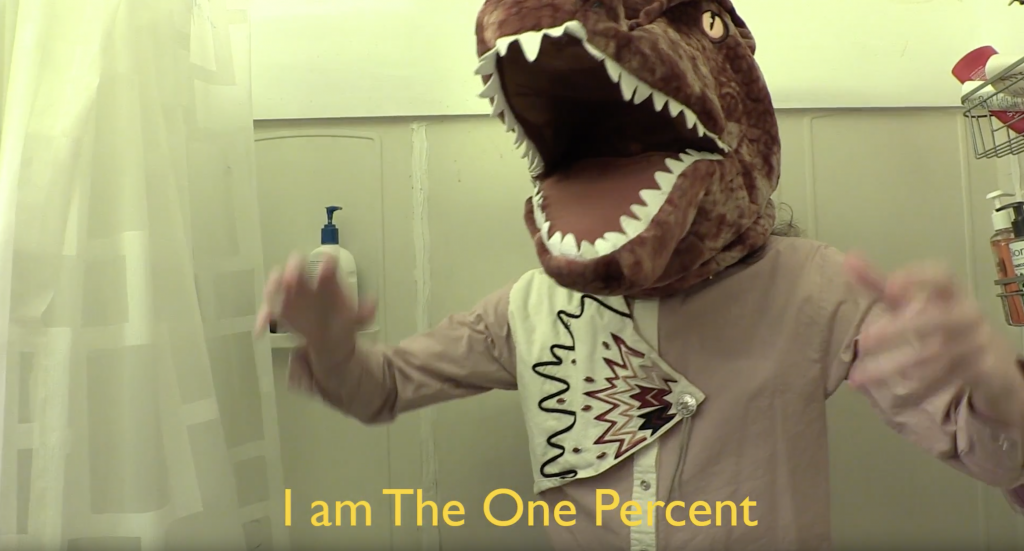
Tanner Bidish: And another problem we had, or maybe it was just something cruel that we did, we got Mike all outfitted as the mermaid and ready to go and he went upstairs to sit in the tub. And then Aaron and Phil left to dump footage onto an SD card and then Billy had another SD card and they were running around town for 45 minutes and Mike was in the bathtub for an hour with his feet taped up just waiting for us.
WOUB: Yeah, I really enjoyed the repetition of the footage of someone finding something in the bathroom.
Phil Hickey: Well, we’re glad somebody liked it.
Tanner Bidish: Yeah, when Phil said we were going to reuse that footage, I was nervous at first. But everyone who watches it seems to like about it now.
WOUB: I really thought that was a part of the film that made it stand out and created a sense on continuity.
Phil Hickey: I love people who told me that when they saw that scene again, they were like ‘g*d d*mmit!’
WOUB: I know you mentioned that you all went in just wanting to have fun, but I was curious if you were ever concerned if the particular sense of humor you catered to throughout the film might not be the same one that the judges had?
Tanner Bidish: Several times throughout the 48 hours I would say something along the lines of “oh man, I feel like Andie Walla is going to hate this,” and at the time I knew it was going to be a ridiculous movie. We never thought about making a movie for the judges, we thought about making a movie for ourselves.
Phil Hickey: This is my fourth 48-hour shootout, and I’ve been on teams where they took it too seriously and it’s nobody’s fault but trying to make a great incredible product in 48 hours unless you’re an incredibly capable team just kind of drags everybody down. And I knew I didn’t want that. I just wanted to cover my friends in meat and play around for a while.
Tanner Bidish: Yeah this was the first shootout I’ve been in, and I didn’t expect to make a professional product, because you only have 48 hours. Some teams really set out to make something wonderful and that’s awesome because that’s a real challenge, but feeding off of everybody else’s energy in our group I was happy to make something ridiculous and I think it made it better.
Phil Hickey: A big part of that was Aaron Born just pushing for it to be ridiculous.
Tanner Bidish: Yeah, we had a lot of silly people on our team.
FIRST PLACE IN FRESHMAN/SOPHOMORE DIVISION
“The Secrets Kept From Us” by the Film Flamingoes
Genre: Musical
It’s a classic tale of a college romance gone awry. Our protagonist believes a life on the silver screen is his destiny, only to find that his beloved is seeing another man. However, things have a way of turning themselves around in romantic musicals.
WOUB: What were your initial thoughts when you were assigned the musical genre?
John Amato, Freshman, Director and Co-Editor: audible sigh We had been joking about what we would do if we were assigned a musical in our meetings before the weekend, so we could kind of come up with a plan of action about what we were going to make. But honestly I wasn’t too worried.
Caleb Winning, Freshman, Assistant Director: Really, it wasn’t too bad. It was just like another form of writing where you had to have the music ready.
Brandon Tasker, Freshman, Actor and Musician: Right away we figured that we just needed to get started as soon as possible to figure out what we were going to do.
WOUB: What about the music? Are any of you trained musicians?
Caleb Winning: Well, I grew up playing piano, but that’s nothing like Allie (Harris, freshman, actress) who is classically trained at it.
WOUB: Wow, Allie, did you help out a lot with the writing of the music, then?
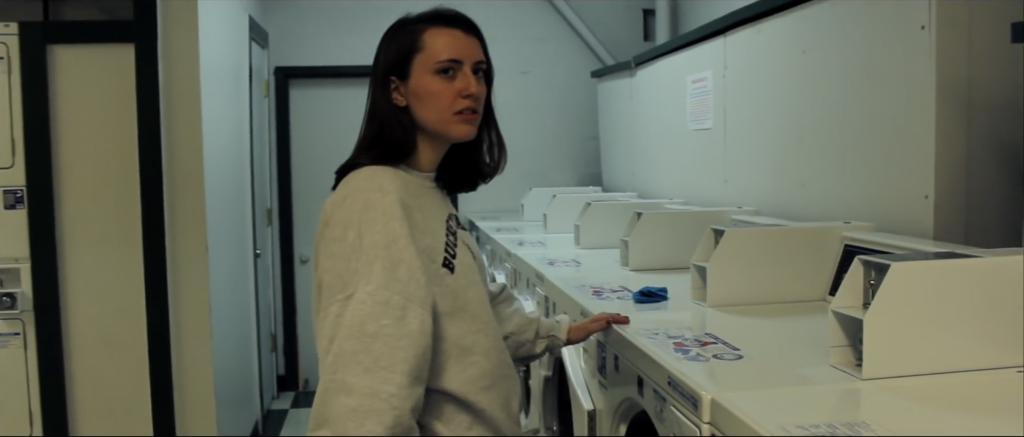
Allie Harris, Actor: My training helped a little when we were brainstorming music, but it mostly had to do with me coming in a playing a few things and then everybody being impressed by it enough that they wanted to use it.
WOUB: How did you go about writing a musical?
John Amato: Basically we decided that we needed to write it based on the line that we were given alongside the prop and genre, and we decided to create the story surrounding that line completely.
Caleb Winning: We wrote the songs and then wrote the script based on those songs, incorporating those songs.
Brandon Tasker: It helped a lot to grow up listening to musical soundtracks. A lot of the stuff I listened to, there wouldn’t really be any talking without music unless it was a really long feature, but since we had like five minutes to work with, we had our characters singing the whole time.
WOUB: How did you come up with the idea of a college romance gone wrong to base the plot on?
John Amato: Well, we had this idea of this guy getting cheated on by a girl, and as we progressed, we added another actress, so it made sense for the main character to meet the other girl and fall in love with her.
Brandon Tasker: Yeah, and Jess (Ulrich) is used to breaking my heart anyway.
WOUB: How about deciding to use the laundry room of a dormitory? I liked that decision.
John Amato: Yeah, we like that laundry room and we had used it in another movie that we made together. We all like that place.
Brandon Tasker: And doing laundry is kind of a lonely thing, you don’t really go to the laundry room looking for love, you’re usually wearing scrubby clothes.
Caleb Winning: It’s also a place that all college students can relate to, because everybody has to do laundry.

